#Stand Designs in Hamburg
Explore tagged Tumblr posts
Text
#Exhibiiton Stand Builder#Exhibition Stand Contractor#Exhibition Stand Design Company#Exhibition Fabrication Company#Exhibition Stand Construction#Exhibition Stands Services#Exhibition Stand Design Company in Nuremberg#Stand Designs in Cologne#Stand Designs in Hamburg#Best Exhibition Stand Builder in Frankfurt
1 note
·
View note
Text
Connect and Engage at Hamburg Open 2025 with Booth Constructor
Engage into an easy, yet interactive participation in the Hamburg Open 2025 with Booth Constructor. We design exhibition booths according to specific requirements. Let our solutions help your brands stand out, from concept to creation. Contact us today to get a head start on making your mark at Hamburg Open!

9 notes
·
View notes
Text
Top Exhibition Stand Design Company in Hamburg for Your Brand
RADON SP. Z O.O. is a leading exhibition stand design company in Hamburg, due to extensive in-house design and construction capabilities. We create visually striking and highly functional exhibition stands that captivate audiences and enhance your trade show presence. Our expert team designs customized spaces that maximize engagement, ensuring a lasting impact on visitors. Partner with RADON SP. Z O.O. to transform your exhibition experience and stand out in Hamburg’s competitive trade shows.

#exhibition stand design company in hamburg#exhibition stand builder#exhibition booth construction in frankfurt#exhibition stand builders company in poland#exhibitionstandbuilder#radonspzoo
0 notes
Text
Get Innovative Exhibition Booth Design Services with Triumfo International GmbH
Acquire exceptional exhibition booth design services from highly experienced professionals at Triumfo International GmbH. We create captivating stand designs tailored to your brand's needs, ensuring a standout presence at every event. Partner with us for high-quality designs that leave a lasting impression on the trade show floor.

#exhibition booth design#germany#smm hamburg#booth stands#exhibition stand design#exhibition design#expo2024#exhibition#january 2025
0 notes
Text
#Exhibition Stand Design & Booth Builder in Hamburg#Best Exhibition Stand Contractor#Exhibition Booth Builders in Hamburg#Exhibition Stand Designs in Hamburg#Exhibition Stand Construction Company in Hamburg#Exhibition Stand Fabrication in Hamburg
0 notes
Note
Oh I been procrastinating playing great god groover, how is it?
The fact I cannot marry this man is a crime against humanity and I have to go live every day knowing I can never have him.

All in all it was a BEAUTIFUL game-It touched on themes I didn't know it would touch on such as Opressive Government, The fact that even the most loving relationships can be harmed with even minor miscommunications, The dangers of Nostalgia, the power of art, standing up for oneself against abusive bosses, the fear of death, the fear of being forgotten, the desire for purpose and a place to fit in, Human Flesh Hamburgers, Wearing a traffic cone on your head and more.
100/10 Game, Would play game, putting it up there with Cult of the Lamb in regards to replay ability, design, endearing characters and assured weird fan art I will be making of it.
31 notes
·
View notes
Text

This job is killing me, literally .
Army-Air Force Reconnaissance Study of 1977
T-R1 and the U-2
In the fall of 1977, Kelly Johnson, leader of the world famous “Skunk Works,” came to the Pentagon and briefed the Air Force Chief on a proposal to put side-looking radar on U-2’s and feed the data to a ground station. They idea was to map the battlefield for the Army and tell them where the tanks were and what they were doing.
The Chief tasked General Slay, Chief of AF Research and Development (R&D), to look into the idea. General Al Slay tasked his M/G Dick Henry and AF XO tasked my boss, B/G Creadon to do a study with the Army.
The study was to be an “all sources” study, which means; all intelligence platforms and collection devices, to include all future satellites, aircraft and ground stations had to be included in the study
The only place in the Pentagon that could do an all source study like this was my office.( Butch’s office was in the basement with a large vault) The study started in September and lasted three months. They worked every day, weekends included and I was the host so I worked every day too.
We had some persons from the; Army, SAC, NSA, DIA, OSD and Air Staff living in our office space. My Lt. Col. Rick Wheeler was the team leader and did a great job.
There was no place in the Pentagon to eat on the weekends so I would go to Ollie’s Trolley and bring back hamburgers for them.
One weekend the motor pool, which was right above my office, turned off the fan that kept carbon monoxide out of the area. Around noon, everyone was acting listless and something didn’t smell right. I called in the firemen and they tested the air, said we would all be dead in a few hours. I sent everyone home.
Rick and I went all over town briefing the study and the concept. We briefed everyone who had the proper clearances to include the CIA, Intelligence Community Staff, DIA, NSA, White House persons and Congress. I BELIEVE THAT WE WERE IN EVERY CLASSIFIED LOCATION IN Washington while briefing this new concept.
This study opened the U-2 line at the Skunk Works. Because the mission was to be tactical support to the Army they were to be called, the TR-1. The U-2 & TR-1 were almost identical, only some wiring was different.
The sad fact of this study was that Congress took funds from the Army (Guardrail) to fund this Air Force Program. The Army never again wanted to do a study with the Air Force.
I big fight began between Tactical Air Command (TAC) and Strategic Air Command (SAC) over who would own and fly them. My boss decided that I should referee the fight.
Each Command sent in a Brigadier General and me, a Colonel, sat between them in our conference room. One of the Generals, the one from TAC later became Chief of the Air Force.( Larry Welch?)
Written by Colonel Richard, Butch Sheffield, in his unpublished book
Some history I looked up. The one major difference between the U-2R and TR-1 was in the electrical system, but when all U-2R and TR-1's got new wiring they all got to be called U-2R. TR-Tactical Reconnaissance. TR-1 was designed to use the ASARS system A tactical reconnaissance version, the TR-1A, first flew in August 1981 and was delivered to the Air Force the next month. Designed for stand-off tactical reconnaissance in Europe, the TR-1 was structurally identical to the U-2R. Operational TR-1A's were used by the 17th Reconnaissance Wing, Royal Air Force Station Alconbury, England, starting in February 1983. The last U-2 and TR-1 aircraft were delivered to the Air Force in October 1989. In 1992 all TR-1s and U-2s were redesignated U-2R.
I am working on a deal right now to get my dad’s book published ~Linda Sheffield
@Habubrats71 via X
#sr 71#sr71#sr 71 blackbird#blackbird#aircraft#usaf#lockheed aviation#skunkworks#aviation#mach3+#habu#reconnaissance#cold war aircraft
21 notes
·
View notes
Text
A Tea Party
Is this another Gravity Falls fan fic?! I've been hooked on Gravity Falls (again). Anyways, enjoy something fun!
Links: ao3, tumblr, masterlist
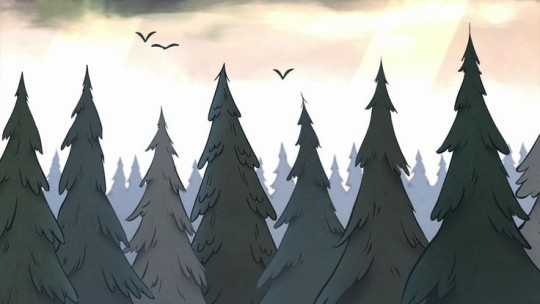
“One order of our hotcakes! Coming right up!” you call out with a wide smile, effortlessly weaving between tables and customers. The Greasy’s Diner is packed to the brim, the clatter of cutlery and hum of conversation creating a symphony of Friday evening energy. The smell of sizzling bacon and freshly brewed coffee fills the air, mingling with the sweet scent of syrup as you glide past a table where a stack of pancakes is being devoured by a group of teenagers.
The diner itself, a quaint train car labeled "Gravity Falls 1883," is a relic of the town’s history, and tonight, it’s alive with the warmth and nostalgia of simpler times. The worn leather booths are filled with families and friends enjoying classic American comfort food—hamburgers, pancakes, biscuits and gravy, soda, and milkshakes, all made to satisfy both hunger and soul.
Lazy Susan, the heart and soul of the diner, oversees everything with her usual charm, her one perpetually closed eye giving her an endearing, slightly mysterious air. She’s been running this place for as long as anyone can remember, and her infectious laughter can be heard even over the din of the crowded room.
“Hey!” you shout over the noise as you approach the open window to the kitchen. “Got another ticket for ya!” You bend down a metal wire to pin the slip of paper, letting it snap back up with a satisfying twang.
“Thanks, (Y/n)!” The chef, whose name you’ve yet to recall, shoots you a playful finger gun, his other hand expertly flipping an omelet on the stove. The kitchen is a sensory overload of sizzling fats, bubbling sauces, and the constant rhythm of plates being prepped and passed out.
“No problem, dude,” you reply, smirking as you return the finger gun, before making your way back to Lazy Susan. The older woman is deep in conversation with a couple at the counter, their discussion sprinkled with the latest gossip from Gravity Falls. You catch snippets of their chatter—a local kid has gone missing, and the only clue left behind is a tiny red shoe fit for a doll.
You roll your eyes internally. Probably just some runaway who ruined the carpet with too much of playable slime, you think, stifling a grin. Parents can be scarier than any of the weird creatures around here.
“Hey there, ladies!”
Your attention snaps to the front door just as you reach for a glass to prep another milkshake. A grizzled old man saunters in, his hand raised high in a wave that’s a little too enthusiastic for someone his age. He’s got two kids in tow, and his black suit, with the missing fez, oozes with charisma—or at least, his version of it.
The boy, who you quickly recognize as Dipper, follows behind, rubbing his elbow, clearly embarrassed by the old man’s antics. The girl, Mabel, matches her great-uncle’s energy, waving confidently at the diner patrons as they find an empty booth.
You set down the rag and milkshake glass, grabbing three menus instead. The large red letters reading "Greasy’s Diner" stand out on the covers, framed by retro designs that scream classic Americana.
As you approach the booth, you paste on your best customer-pleasing smile. “Evening, Stan!” you say brightly, handing him a menu before turning to the twins. “How are you, Mabel?” You purposely ignore Dipper, even going as far as handing his menu to Mabel.
Dipper’s mood shifts the moment he spots you. He straightens up, as if caught off guard by your presence. “(Y/N)—” he start.
Mabel, ever the bubbly one, beats him to it. “(Y/n)! You’re working today!”
You smile back, genuinely pleased to see her. “Yep. Friday nights are usually the busiest. Wouldn’t want to miss out on the money.”
Stan cuts in with a wide grin, his voice booming across the diner. "Why, I like my money like I like my pancakes! Stacked high and never touched by anyone but me!" He chuckles, clearly pleased with his joke, and then adds, “Only I know how to properly appreciate a good stack!”
You laugh, though it’s a bit forced, but you appreciate the effort. He’s still a paying customer, you remind yourself, though you can’t help but find some amusement in his antics. “So, a stack of fresh, hot pancakes for you, then?”
“You betcha!” Stan says, swinging his arm proudly.
You turn your attention to the twins, holding your notepad ready. “And what about you two?” you ask, curiosity lacing your voice as you wait for their orders.
Dipper glances up at you, his confidence returning just a bit. “I’ll have the, uh… the usual,” he says, trying to sound nonchalant, but there’s a hint of something in his voice.
Mabel beams, clearly more interested in the interaction between you and her brother than the menu. Her eyes darts between the two of you. “I’ll have the biggest milkshake you can make!” she chirps, her eyes sparkling with excitement.
As you jot down the orders, you can’t help but notice the way Dipper’s gaze lingers on you, almost as if he’s trying to figure you out. There’s something different in the air tonight—an unspoken tension that’s annoying.
Walking away, you pin the order slip to the metal wire with a little more force than necessary, the clatter echoes in the busy diner. You try to shake off the strange feeling lingering from Dipper’s gaze, but it nags at you. What’s his problem, anyway?
It’s not the first time Dipper’s actions have left you feeling sidelined. You can’t help but remember the countless instances where his obsession with solving mysteries and spending time with Grunkle Ford took precedence over his promises to you. One memory, in particular, stands out:
A few weeks ago, you, Dipper, and Mabel had planned a simple day out together—nothing special, just some time to hang out, grab ice cream, and maybe catch a movie. It was supposed to be a break from all the supernatural chaos that constantly surrounded Gravity Falls.
But then, just as you were about to head out, Dipper received a call from Grunkle Ford. There was some new anomaly that needed investigating, and in an instant, Dipper’s focus shifted entirely. “I’m really sorry, but Ford needs me for this,” he had said, already halfway out the door before you could respond. “We’ll hang out later, I promise!”
“Later” never came. Dipper had spent the entire day with Ford, lost in whatever mystery they were unraveling. You wouldn’t even had mind his behavior, if he bothered to invite you!
You had tried to brush it off, telling yourself that Dipper didn’t mean any harm, that he just got caught up in the moment. But it wasn’t the first time this had happened. There were other days, other plans that had fallen because of some mystery that he had to solve with Ford. And it wasn’t just the cancellations. Even when you did something thoughtful for him—like covering for him during one of his late-night research sessions or helping him decode a cryptic passage in the journal—he rarely seemed to acknowledge it. There were no thanks, no gestures to return the favor. It was as if he took your support for granted.
Over time, those small slights and unfulfilled promises built up, leaving you feeling more like a convenient sidekick than a true partner in his adventures. You had your own interests, your own life, but it often felt like Dipper only noticed you when it served his latest quest.
You huffed loudly, to no one in particular, and busied yourself by filling up three glasses with water and ice, but your mind keeps drifting back to Dipper. Maybe he’s just trying to get under your skin, like usual. You roll your eyes at the thought, but the annoyance doesn’t fade.
“How’s the shift, sweetie?” An older man beckons you over, his warm smile instantly putting you at ease.
You return the smile, walking over to him with a friendly nod. You place the cups on a round silver tray, the ice clinking gently in the glass cups. “It’s busy, but that’s how I like it. How about you? How’s your evening going?”
The man chuckles, adjusting his cap. His finger laces around a mug of dark fizz, soda you presume. He brings it to his lips for a sip. “Oh, just fine. I’ve been coming to this diner since before you were born, I reckon. Always a pleasure to see a new face behind the counter. You’re doing a great job, kid.”
You laugh softly, leaning on the counter as you chat with him. “Well, thanks! I’m just trying to keep up with the pace around here. Greasy’s is a pretty lively spot.”
As you continue your pleasant conversation, you notice the older man’s eyes light up as he talks about his favorite memories of the diner. You find yourself genuinely enjoying the exchange, smiling and laughing as the workday stress melts away.
However, unbeknownst to you, Dipper’s expression darkens as he watches you and the older man chatting. He’s hands are clenched a little too tightly, and his jaw is set in a way that’s impossible to ignore.
Just as the older man begins telling a story, you hear a commotion coming from the booth where Dipper and his family are seated. Mabel is leaning across the table, whispering something to Stan with a mischievous grin. Her brother glances at them, his eyes narrowing slightly, and suddenly, you have the distinct feeling they’re plotting something.
Your suspicion is confirmed when Mabel raises her hand, calling you over. “(Y/n)! Can we get some extra napkins? I think we’re gonna need them!”
You raise an eyebrow, but nod, grabbing a handful of napkins from the dispenser and the round tray of ice cold water. As you approach their table, you notice Stan looking far too innocent, while Dipper avoids eye contact altogether, staring intently at the salt shaker as if it holds the secrets of the universe.
“Here you go,” you say, handing the napkins to Mabel. She beams up at you, but there’s a glint in her eye that makes you hesitate. You smoothly slide the cups of water to each customer. Something’s definitely up.
You glance at Stan, who’s grinning behind his menu, clearly trying to suppress a laugh. The con-man is a walking prankster, and with Mabel involved, there’s no telling what they’ve cooked up. Dipper finally peeks up at you, his cheeks slightly flushed, but he quickly looks away again when he catches your gaze
“Thanks, (Y/n)! You’re the best,” Mabel chirps, her tone a little too sweet. Before you can respond, she "accidentally" knocks over her cup of water, sending a cascade of ice cubes and liquid spilling across the table—right onto Dipper’s lap.
Dipper jumps up with a startled yelp, grabbing the napkins to frantically blot at the spreading wet patch on his pants. “Mabel!” he hisses, his face turning a deep shade of red.
“Oh no! Dipper, I’m so sorry!” Mabel exclaims, though the grin tugging at her lips betrays her true feelings.
Stan bursts out laughing, slapping the table with delight. “That’s my girl! Good one, Mabel!”
You bite your lip, trying not to laugh, but the sight of Dipper, usually so composed and serious, flailing around like that is too much. A snort escapes before you can stop it.
“Oh, so you think this is funny, huh?” Dipper snaps, glaring at you, but there’s no real anger in his voice—just frustration mixed with embarrassment.
“Maybe a little,” you tease, crossing your arms and raising an eyebrow. “Need some help, or do you got this?”
Dipper’s eyes narrow as he grabs a handful of napkins, blotting at the mess. “I’m fine, thanks,” he mutters, though the wet stain on his shirt suggests otherwise.
Mabel, still giggling, tries to cover for her brother. “Come on, Dipper, it’s not that bad. Besides, maybe (Y/n) can help you clean up. You know, since she’s so good at her job.”
You’re about to retort when Stan cuts in, still chuckling. “Yeah, yeah. And maybe after that, you two can work out all that weird tension between ya. It’s like watching a soap opera in here!”
Your cheeks heat up, and you shoot Stan a glare, but he just leans back, completely oblivious to how uncomfortable his comment made you feel. Dipper, on the other hand, looks like he wants to crawl under the table and disappear.
Trying to regain your composure, you grab a clean towel from the counter and toss it to Dipper. “Here, use this. And next time, try not to wear your drink.”
Dipper catches the towel, his expression softening slightly as he mumbles, “Thanks.”
You nod, turning to leave, but not before catching a glimpse of the small, appreciative smile he’s trying to hide.
As the evening continues, you find yourself busy with the usual rush of orders, but your mind keeps drifting back to the incident with Dipper. You can’t quite shake the image of his flustered expression or the way his eyes softened when he thanked you. It’s confusing and… uncomfortable? You couldn’t quite place a finger on it.
You glance over at the Pines family every now and then, noticing how Mabel happily slurps her confetti milkshake, chattering animatedly about a theater show she wants to see, while Stan devours his stack of pancakes. Dipper, on the other hand, seems quiet. He’s eating his burger, but his gaze occasionally flickers toward you, as if he’s lost in thought.
When the dinner rush finally starts to wind down, you take a moment to catch your breath, leaning against the counter. The atmosphere in the diner has mellowed out, with fewer customers and the soft hum of the radio becoming more apparent. You’re just about to head back to the kitchen when you notice Dipper standing up from the booth, his eyes scanning the diner before they land on you.
He hesitates, looking like he’s about to say something, but then he glances at Mabel and Stan, who are still engrossed in their meals. With a deep breath, Dipper makes his way over to you.
“Hey, (Y/n),” Dipper greets you, leaning against the counter. His hands are fidgeting with themselves. “So, have you heard the latest rumors about the missing kid?”
You raise an eyebrow. “You mean the one about the abducted children and the tiny red shoe they found at the latest crime scene?”
Dipper nods. “Yeah, that’s the one. I was actually going to check it out tonight. You know, see if I can figure out what’s really going on.” He pulls out a journal with the number three, flipping to a page. He flips it around and brings it up to your face. “You see, Ford and I took a sample from the scene and we think it has to do with this…”
You glance at the page in the journal, which features a cute drawing of a Victorian style doll with a pair of cartoonish eyes. “The doll: ‘Polly?’ What’s that supposed to be?”
Dipper leans in, his expression serious. “The story goes that Polly was once a beloved toy of a child who went missing years ago. Since then, she’s been wandering the town seeking lonely children to kidnap, hoping that one of them will love her.”
You raise an eyebrow. “And how exactly does she lure these kids?”
Dipper continues, his voice low. “It’s said that Polly’s presence is accompanied by a soft, haunting melody that only children can hear. She creates illusions of a warm, inviting home and plays with them until they trust her. Once they’re close enough, she tries to entice them to follow her and stay with her forever.” He clears his throat and notes quickly, “Though, Grunkle Ford never actually saw Polly. He only heard rumors and descriptions of her from other creatures he’s encounter.”
Scoffing, you place a hand on your hips and take a step back. You try to keep your tone casual, but a hint of sarcasm slips through. “Polly sounds like something straight out of a horror movie, Dipper. Who knows, maybe those monsters actually lied to Ford? Maybe she doesn’t even exist.”
Dipper’s voice raises in annoyance. He’s taken aback by your unbelief. “It might sound like a cliché, but the evidence we’ve found aligns with the description.” He points exaggerately at the image of the doll. “The missing children reports suggest something unusual is going on. If there’s even a chance that Polly is involved, we need to deal with it.”
You rolled your eyes, your frustration bubbling to the surface. “Who’s we? You didn’t need me then, so why do you need me now?”
Your words carry a sharp edge, and Dipper flinches slightly, clearly catching the reference to that time he stood you and Mabel up for monster hunting with Grunkle Ford.
Dipper’s eyes narrow slightly, but he doesn’t back down. “I know I ditched you, but this is different. This is about doing what we can to protect people. Don’t you want to protect Gravity Falls?” He waves a hand around at your customers. Their happy faces pangs your heart.
“There is no we in this, Pines,” you snap, shaking your head as you let out a loud, frustrated sigh. Pinching the bridge of your nose, you try to keep your irritation in check. “Look, I have enough on my plate as it is. I don’t want to get involved in another one of your mystery adventures.” You glance away, making your frustration obvious. “Why don’t you go ask Ford?”
Dipper shifts uncomfortably, his resolve wavering for just a moment before he steels himself. “Ford’s busy with his own stuff, and—look, I know it sounds crazy, but you’ve got a knack for handling these situations,” he insists, his voice firm but pleading. “I wouldn’t ask if I didn’t think you could help.”
You scoff, crossing your arms and refusing to look at him. “Oh, so now you need me? Where was that when you ditched us for Ford last time?”
Dipper’s face tightens, but he doesn’t back down. “I messed up then, I get it. But this isn’t about the past. It’s about what’s happening right now. We’re dealing with something dangerous, and I need someone I can count on. I need you.”
His words hang in the air, and for a moment, you can see the sincerity in his eyes—the same eyes that had once dismissed your insecurities about your friendship as unpredictable and unnecessary. It’s infuriating how he can just flip the script when it suits him, but there’s something about the way he’s looking at you now that gives you pause.
You let out a heavy breath, still reluctant but sensing the gravity of the situation. “Fine,” you mutter, half-annoyed, half-concerned. “But don’t think this means I’ve forgiven you. And if we end up in another life-threatening situation, you’re on your own, got it?”
Dipper nods, his expression softening with relief. “Got it. And… thanks. I won’t let you down this time. I’ll meet you at the house where the last kid was abducted at midnight”
You roll your eyes, but the slight dip in your guard shows that maybe, just maybe, you’re willing to give him one last chance. You walk away from the counter, feeling the weight of the evening ahead pressing down on you. The clock’s hands tick around the circle, and midnight approaches with relentless inevitability. You’ve already wrapped up your shift at Greasy’s Diner, and now, at home, you’re preparing a backpack filled with adventuring tools: a flashlight, a multi-tool, and a first aid kit. You double-lace your shoes, mentally preparing for whatever challenges the night might bring. The last thing you want is to be caught unprepared.
You glance up at the wall clock; it reads 11:40 PM. A deep dread settles in the pit of your stomach. This was the last thing you wanted to be doing today. With a resigned sigh, you throw on a thick jacket, feeling its weight as a reminder of the cold night ahead. You flick off the lights and check to make sure everything is in order.
Your aunt and uncle, exhausted from the day, had fallen asleep hours earlier. Their snoring from the bedroom reassures you that they’re not likely to wake up anytime soon. You quietly slip out of the house, making sure the door is securely locked behind you.
Outside, the chill of the night air bites at your cheeks as you pull the hood of your jacket up and shove your hands deep into your pockets. The quiet of the neighborhood is both eerie and comforting. The streetlights cast long shadows, and the only sounds are the distant hum of late-night traffic and the occasional rustle of wind through the trees.
You approach a rustic home made entirely of wood, from its walls to its rooftop. It’s wrapped with yellow tape from police officers, warning you to keep out of the crime scene. Beside the home is an old, beat-up vehicle parked in front of a small garage. The paint on the car is scratched and damaged, indicating it’s well-loved. On the small lawn was a pink plastic flamingo. A pair of sunglasses sat on top of it’s large beak.
You wait by the picket fence, hoping the neighbors won’t notice you loitering around. Glancing up at the stars, you notice they twinkle brightly, as if calling out to you.
Finally, Dipper arrives, huffing and puffing as he catches his breath. “You ready?”
You nod, pushing aside your lingering dread. “Yeah, let’s get this over with.”
You follow him as he leads the way, your footsteps crunching softly on the gravel path. Dipper ducks beneath the yellow tape, and then holds it higher to allow you to follow suit. The house is old and weather-beaten, with overgrown weeds encroaching on the yard. The dim light from a single streetlamp flickers erratically, casting eerie shadows.
Dipper stops near the front porch and pulls out a small flashlight, its beam cutting through the darkness. “We’ll start by checking here. Polly might have left more then just a red shoe behind.” He cracks open the slightly ajar door, it creaks loudly, notifying you of his rusted hinges.
As you both begin your search, the air grows colder, and the silence becomes almost deafening. The occasional creak of the house seems unnaturally loud. You move cautiously, scanning the area for anything out of place.
You approach a pile of toys in the living room, noticing some are faded and worn, while others are oddly pristine. “Hey, Dipper!” You call out to him. As he approaches, you knelt down and pick up plastic toy horse. “It’s like they’ve been left here for a while.
Dipper crouches down and examines them more closely. “Polly might use them to lure children, making it seem like she’s offering friendship.”
Your eyes fall on a small, delicate music box among the toys. Its paint is chipped, but it’s still intact. “This music box could be important. Do you think it’s connected?”
Dipper picks up the music box, turning it over in his hands. “Maybe. The journal mentioned a haunting melody. If this is what Polly uses, it could help.” He tilts it to one side, noticing a handle sticking out of the container. The brown haired boy begins cranking it, slowly and firmly until a melody begins playing.
You and Dipper stand frozen, recognizing the song. The music box’s tune lingering in the air, its hauntingly beautiful melody now accompanied by a ghostly, girlish voice singing softly in your minds. The eerie lyrics resonate with an unsettling charm:
Twinkle, twinkle, little star, follow me, we won’t go far. In the woods where shadows play, come with me, we’ll laugh and sway.
Skip and hop, the night is bright, in the dark, we’ll find delight. Close your eyes, and hear the tune, magic whispers, come real soon.
Twinkle, twinkle, stay with me, in this land of mystery. Through the night, and past the trees, let’s discover what there’s to see.
A shiver runs down your spine, and you glance nervously at Dipper, your throat tightening as a thick lump of fear settles in. “D-Did you hear that?” you whisper, your voice trembling.
Dipper’s face pales as he nods slowly, his eyes wide with apprehension. “Yeah, I heard it. It’s like the song is trying to reach out to us.” He takes a deep breath, trying to steady his nerves. His expression is resolute. “Let’s follow the melody.”
You shake your head, vehemently disagreeing with the person you thought was bravely foolish. “Look,” you took a step back and put your hands palm facing towards him. “I’m done with whatever this is. Ghosts? Monsters? Fine. But haunted dolls? Absolutely not. You and your endless mystery adventures can take a hike.” You jab your thumb back toward the door, making it crystal clear that this isn’t your cup of tea.
Dipper’s eyes narrow, his face hardening with determination. “I get that you’re scared, but this isn’t the time to back out. We’ve already started, and if we don’t follow the melody, we might miss a chance to stop whatever Polly’s planning.”
You cross your arms, scowling. “You think you’re so brave, don’t you? Always jumping into the unknown without thinking things through. Maybe you’re used to getting yourself into these messes, but I’ve got my own limits.”
Dipper takes a step closer, his tone sharp. “This isn’t about being brave or foolish. It’s about saving children before they all die.”
You glare at him, frustration clouding your judgement, developing your words into something more raw, more painful. “That’s all you care about, isn’t it? The adventure. The thrill. You’ve never once stopped to think about how this affects the people around you.”
Dipper’s taken aback, his expression faltering for a split second before he quickly recovers. “That’s not true. I care about—”
“About what? About saving the day? About being the hero?” You cut him off, your voice trembling with the weight of everything you’ve been holding back. “But what about me, Dipper? What about the fact that every time you drag us into one of your mysteries, we’re the ones who have to pick up the mess? You don’t even care that I’m scared out of my mind right now.”
Dipper opens his mouth to argue, but no words come out. He looks at you, really looks at you, and for a moment, you think he might finally understand. But then he shakes his head, his eyes show a lack of emotion, of empathy. “I do care, but it’s not about what we want or how we feel. It’s about doing what’s right.”
Your heart sinks, the finality of his words hitting you like a punch to the gut. “Of course,” you say bitterly, turning away from him. “It’s always about solving the mystery.”
Dipper reaches out, as if he wants to say something more, but you step back, avoiding his touch. The silence between you is heavy, filled with everything that’s been left unsaid.
You clench your fists, feeling a mix of anger and something else you can’t quite name. “Fine. But don’t expect me to follow blindly. If we’re doing this, you better have a plan that doesn’t involve us ending up as Polly’s next victims.”
The boy swallows his words, and turns away. “No problem,” Dipper says sarcastically, waving a hand dismissively as he heads towards the back door, the music box in hand. “Follow me. I bet I know where this thing is leading us.”
You both trudge through the dark woods, your flashlights cutting through the shadows that dance ominously on the tree trunks. Dipper had tossed the music box to you, instructing you to wind it up repeatedly. Despite the incessant, irritating melody, there’s something oddly soothing about it, a small comfort amid the tension.
“So,” you call out, peering over Dipper’s shoulder, “where exactly are we headed?”
Dipper is focused on journal 3, which he’s holding with a purple flashlight. The light reveals hidden text, and a small drawing in the corner, depicting field of flowers and a tea party, surrounded by doodles of stars.
He glances at you. “We’re trying to find this.” He points to the vague, almost insignificant drawing. “The rumors claim that Polly in a clearing by a lake.”
“…and you know where this is… how?” you ask, skeptically.
“Intuition,” Dipper replies with a shrug, as if it’s obvious. “But mainly because the music box is guiding us. It’s like a beacon. Without it, we’d be stumbling around blindly.”
You pause in step. Your eyes widen in disbelief. “So, you’re telling me that if we wander around randomly in the forest, we’ll eventually find Polly?”
“That’s the plan!” Dipper grins, looking both confident and a bit foolish.
You scowl, feeling a mix of irritation and reluctant admiration. “Great. So we’re just hoping the music box is as good as you think it is. I suppose if we end up lost or worse, we can thank your ‘intuition’ for it.”
Dipper’s grin falters slightly, but he maintains his proud expression. “We’re in this together now. Just keep winding the music box. We’ll find our way.”
You mutter under your breath, but your grip on the music box tightens. Despite your irritation, you’re almost envious of his lack of doubt. As you both push deeper into the forest, the night seems to close in around you, the eerie melody from the music box being the only grounding normalcy.
Finally, you notice the peaks of flowers emerging from the ground, growing more abundant as you approach. Beyond them, a clearing beside a lake comes into view. Then, your eyes fell onto the tea party that was described in the book.
What catches you off guard is the sight of an elaborate setting, a scene that would ordinarily evoke quaint charm but now strikes you as profoundly unsettling. The long table, set with intricate lace tablecloths, is laden with porcelain teapots, delicate cups, and an array of pastries that seem untouched, as if waiting for guests who will never arrive.
Seated around the table are numerous stuffed animals, each dressed in pastel-colored dresses and suits that shimmer softly in the moonlight. They sport tiny hats and monocles, their glassy eyes reflecting the dim glow of the shining stars. The stuffed animals are arranged as if in the middle of an animated conversation, their poses frozen mid-action—a teddy bear holding a teacup; a bunny poised with a strawberry, glazed scone; a dog with a red bowtie sitting politely; and a duck in a dapper suit, all seemingly caught in a moment of eternal tea-time.
Pastel balloons are tied to the backs of the chairs, their soft, muted colors creating a deceptive air of festivity. The balloons sway gently with the breeze, casting playful shadows that flicker across the scene. The entire setup exudes an air of mock merriment.
However, the true horror reveals itself as you take in the sight of the missing children sitting in between each stuffed animal They are sprawled around the table in a disturbingly serene manner. Their bodies positioned as though they had simply fallen asleep amidst the party. Their heads hang limply to the side, faces expressionless, and their mouths slightly ajar. Not a single noise escaped them as their pale faces barely take in a breath of air. Their clothes, once vibrant with life, now look out of place amidst the cheerful pastel decor.
The air is heavy with an unsettling stillness, and the soft, haunting melody from the music box persists, filling the silence. The children’s passive forms etch themselves into your mind, a haunting image that you know will stay with you.
Your breath hitches. You take a step back, your foot crushing a delicate poppy. “I-I don’t think—” Panic surges up your throat, choking off your breath and words. The sight is overwhelming, and you struggle to process it.
Dipper turns around and looks at you. You can see the frustration in his expression, the way his jaw tightens as he glares at you. “Are you seriously going to bail now?” he snaps, his voice edged with impatience. “We’ve always gotten through everything because we stick together. And now you’re just going to walk away?”
His words cut through the fog of your fear, anchoring you to the present. You glance up at him, seeing the earnest resolve in his eyes. But the sight behind him—the children, so unnaturally still—won’t leave your mind. “Do you see that?! What could your plan possibly do against—” You gesture wildly at the scene, your voice trembling with a mix of fear and disbelief. “That?!”
Dipper’s face hardens as he hears your hesitation, and there’s a flash of anger in his eyes. “You think I don’t get it? This is terrifying. But you’re the one person I thought I could count on, and you’re leaving on me when I need you the most?”
His words sting, and you can feel the weight of his disappointment pressing down on you. The sight of the children, so disturbingly still, tugs at your resolve. Your breath hitches again, the overwhelming situation pulling you in different directions.
“You think I don’t understand?” you counter, your voice shaking with fear and frustration. “This is too much! You’re acting like I’m just supposed to—”
Before you can finish, Dipper interrupts, his tone softer but still firm. “Look, I know I’ve messed up. I’ve said and done some things I shouldn’t have. But right now, we need each other.” He ends, confidently.
It’s so dismissive that it leaves you wide eyed in disbelief. He actually doesn’t care about you.
With a heavy sigh, you finally relent. “Okay, okay,” Feeling the weight of the situation and his words, you place two hands up in mock surrender. “Whatever. I’ll stay.”
Dipper’s face softens slightly, though the tension remains. Without another word, he begins walking up to the clearing. The faint glow of his flashlight dances ahead, casting flickering shadows on the walls. You follow closely behind.
As you approach the long table, your eyes are drawn to a striking figure perched at the head of the table. There, on top of a tall, ornate stool, sits a stunning Victorian doll, commanding the center of attention. Her golden blonde curls are meticulously arranged, cascading down her back. Atop her head is a baby pink bonnet with an elaborate lace trim, secured with matching ribbons that flutter gently in the breeze, as if beckoning you closer.
The gown is a soft pastel shade—baby pink—adding to its ethereal charm. The bodice of the dress is fitted, accentuating the doll's delicate form, and features a high lace, white collar that frames her porcelain neck with intricate patterns. At the center was a bright blue broach.
The skirt of the dress featured multiple layers of fabric. The top layer of the skirt is adorned with delicate lace trim, which falls in soft, scalloped edges, and is decorated with tiny rosettes. The hem of the skirt is finished with a delicate lace ruffle, giving it a dreamy, almost fairytale quality.
On her feet were a pair of lace socks. One foot had an accompanying red shoe. The other was missing it.
You look at Dipper, who is also frozen, his eyes wide with uncertainty. Before he can speak, a loud, shrill voice interrupts.
“Uninvited guests!” The voice echoes through the clearing, causing both of you to jump.
Your gaze snaps to the source of the voice. You scan the attendees—stuffed animals and the motionless children—before your eyes settle on the doll. Her beautiful porcelain face, pale and delicate, displays two rosy cheeks and a soft, closed smile. Her eyes are shut tight, but a chill runs down your spine as you wonder—did she just... speak?
The voice carries a singsong quality as it continues. “Welcome to my party, but you’re terribly late! The fun is about to begin, and I do hate to wait.” The doll’s arm raises slightly, her hand perpetually open. Though she cannot truly point, the gesture directs your attention toward two chairs set at the far end of the table. These chairs, ornately decorated, are clearly intended for the guests of honor—chairs that seem to beckon with a chilling invitation.
The air grows colder, and the haunting melody from the music box had long since muted in place. The doll’s gaze remains fixed ahead, her closed eyes concealing whatever dark intentions lie behind them.
“You’re just in time for tea,” the doll continues, “So come and sit, don’t let it be.”
Dipper shifts his weight from one foot to another. He glances at you, and then says. “O-Oh um, we’re not here—”
You interrupt him, your voice laced with urgency. “Sure! Don’t mind if we do!” You grab his arm and yank him along, leaning in close to his ear. One hand shields his ear from the doll’s sight as you whisper harshly, “We have to play along. Don’t make it angry, Dipper. The last thing we need is for that thing to think we’re party crashers.”
Dipper’s eyes widen in realization, and he nods vigorously. “Okay. Sure. That sounds good.” He gives three uncertain confirmations.
You both approach the ornate chairs at the head of the table, their plush, pastel-colored cushions inviting and deceptively comforting. As you sit, the cushions mold around you, cradling your weight with a softness that feels almost too soothing, as if coaxing you to relax.
The doll’s face remains fixed in its serene smile, her closed eyes seemingly gleaming with satisfaction. Her hand drops back down to her side, and instead, a white teapot adorned with pink bows rises from the table, hovering gently in the air.
With a whimsical lilt in her voice, the doll says, “I do hope you’re hungry, for tea and cake we’ve got. But before we begin, a little joke—don’t you think that’s a lot?”
She pauses, as if waiting for a response, then continues with a playful tone, “Why did the teacup frown and pout? It lost its sugar and cream, without a doubt!”
The eerie laughter that follows is almost mechanical, as if it’s been rehearsed. The stuffed animals begin to jiggle and bounce in their seats. It’s as if the stuffed animals are performing a grim, choreographed routine, their movements and laughter meticulously timed. Their glassy eyes seem to twinkle with an artificial delight, their stitched smiles stretching wider as they moved merrily.
You exchange a tense glance with Dipper, the bizarre nature of the scene amplifying your unease. You offer a stiff chuckle, which Dipper mirrors, attempting to blend in with the strange atmosphere.
Instantly, the laughter ceases, as if it were a switch that had been flipped. The sudden silence is nerve-racking, making your stiffened smile feel even more out of place.
The teapot glides across the table, its movements smooth and deliberate. It pauses in front of your and Dipper’s tea cups, the spout extending as it begins to pour a dark liquid. The steam curling from the cups carries a faintly burnt scent, mingling with the underlying bitterness.
The teapot sets itself down softly onto a lace doily, the porcelain clinking gently. You observe the tea as it settles in the cups, the dark liquid swirling slightly with the motion.
Her mechanical, yet oddly enchanting voice chimes in. “Would you like some milk or sugar in your tea? Or perhaps both, to make it sweet and neat?” Her eyes remains closed, her head was set straight, neither looking or tilting to observe the both of you.
The jar of sugar cubes and the small pitcher filled with milk lift gracefully into the air, floating over toward you with an almost magical precision. The doll’s eyes remain closed, but her posture is expectant, as if eagerly awaiting your choice.
Dipper glances at the hovering items, then at the doll. “Um… neither?” he says hesitantly. The doll’s serene smile twitches at the edges, her head tilting slightly to the side in a manner that seems almost disappointed.
A moment passes. One long moment.
You can almost feel the shift in atmosphere, a cold weight settling over you as you realize the doll’s displeasure. To avoid any further ire, you swallow hard and stammer, “S-Sugar��� please.” You quickly add, “Thank you,” hoping to placate the doll and salvage the situation.
Polly’s smile smoothly returns to its original, serene curve. She straightens her head back to its normal position, her posture relaxing as if satisfied with your response.
"How many sugar cubes shall I add?" Polly inquires, her shrill voice directs its attention towards you. "Just one? Or two? Or perhaps more—make sure to choose with care, for sweetness brings delight or despair."
Her hand, though rigid and fixed, seems to gesture towards the jar of sugar cubes with an almost imperceptible twitch, as if hinting at the gravity of your decision. She giggles, enjoying her jokes.
“T-Two is fine,” you squeak out, your voice trembling with fear.
Two sugar cubes, lifted by a silver spoon, float gracefully from the jar and tumble into your tea, where they dissolve into the dark liquid with a soft hiss. The milk and sugar set themselves back on their respective lace doilies with a gentle flutter.
An oppressive silence falls over the clearing. The stars above shine brightly, but their light only amplifies the eerie stillness of the field—no insects buzz, no rustling from hidden creatures. Just an unsettling quiet.
“Drink,” Polly demands, her voice now stripped of its rhyming whimsy. The sudden shift in tone sends a chill down your spine. Your gaze flits between Dipper, the doll, and your cup of tea, the weight of Polly’s command pressing down on you as you reluctantly prepare to sip.
As you lift the cup to your lips, your hand trembling, Dipper suddenly springs to his feet.
“Actually um,” Dipper begins, his voice slightly wavering but attempting to sound confident, “we’re not here to play. We wanted to ask you a question.” He glances over at you, visibly relieved that the focus has shifted off the tea, but his satisfaction quickly fades as he sees the dread in your eyes.
Polly’s eyes suddenly snap open. They are a startlingly bright blue, the same shade as the broach on her dress. Her gaze locks onto Dipper, the intensity of her stare making you squirm.
Polly's grin remains fixed, her lips curling slightly as she begins to speak in a sing-song.
“Questions and answers, the game we play, but you must sip your tea before you sway. Ask away if you dare to pry, but remember, there’s no going back once you try.”
Her eyes twinkle with a hint of mischief as she continues.
“Words have power, as you’ll soon see, one sip and you’ll uncover what’s meant to be. But if you refuse, there’s a price to pay, and the answers you seek may slip away.”
Dipper swallows hard, his resolve wavering under Polly’s relentless gaze. “We’re just trying to find out what happened to the missing kids. Can you help us?”
Polly’s smile widens, her eyes never leaving Dipper. “Ah, the missing ones, so close to our hearts, But to learn their fate, the tea must start. Sip and reveal what lies beneath, or face the consequences of your disbelief.”
“Dipper!” You lean over your chair, grabbing at his vest with a tight grip. The fabric bunches up in your hand as you tug him closer. “We have to play along,” you insist, your voice a low, urgent hiss. The frustration in your tone seems to only aggravate him further, and he shakes off your hand with a scowl.
“No way!” he hisses back, his voice laced with panic. “We don’t know what’s in that thing!”
You turn your attention back to the tea cup, its dark liquid swirling ominously. The fear of what’s inside is unnerves you, but drinking it is the only way to get Polly to cooperate. With a determined breath, you lift the cup and lock eyes with Polly, who’s watching you intently. “If I drink this, will you cooperate with us?” you ask, trying to keep your voice steady despite the lump in your throat.
Polly’s eyes lock onto yours with an unnerving intensity as she considers your offer. The eerie, porcelain doll remains perfectly still, her unsettling smile never wavering.
“Ah, a brave soul, how rare to see,” she begins, her voice lilting in a rhythmic, almost melodic tone. “A sip from the cup, and questions shall be free.”
You breath out, almost sighing. With a final, resolute glance at Dipper, who watches with anxiety, you lift the cup to your lips. The liquid inside is dark and opaque, its aroma bitter and uninviting. Polly’s gaze follows every movement with a sinister patience.
You take a long sip of the black tea. The liquid is shockingly hot and has a taste that is both earthy and bitter, lingering on your tongue. You swallow, feeling the warmth spread through your chest.
Polly remains fixed on you, her eyes unblinking and intensely focused. Her smile doesn’t waver as you put the cup back down on the table
“Well done,” the doll tilts its head, pleased by your action. “You’ve proven you’re willing to play. Now, tell me what you seek, and I’ll give you a chance to speak.”
You opened your mouth and began, “How do we convince you to give us the missing children?”
The Victorian doll stands up her short legs seems to balance her on top of the stool. “Tell me why you seek to save the children from their dream. For here with me, they are content and serene. They dream of love, their hearts entwined, with parents and loved ones, all perfectly aligned.”
“Because,” you stood up as well, uncomfortable with how indominable she appeared. “They need to return to their actual parents who miss them!”
Polly’s eyes, now bright and gleaming, open wider. Her voice, though sweet, carries a hint of sorrow. “But you see,” she replies in a sing-song tone, “Their parents left them lonely, left them on their own. Deprived of the love and the attention they craved, so I whisked them away to a world they’d be saved.”
It was impossible to argue with her, you realized. She saw herself as an angel of saving grace for the lonely children of Gravity Falls. Nothing was going to change that. “What… will happen to them if they stay with you…?” You pause between each word as your voice grew into a dim whisper.
Polly’s porcelain smile remains, but her voice turns colder. “If they stay with me, dear, they’ll slumber here, sweet and dear. Their bodies will wither, and their spirits will fade, while I keep them close in the shade.” A chill runs down your spine as Polly’s words become clearer. Her serene face seems almost mocking as she continues. “They’ll dream of a world where they’re never alone, but time will pass and their bodies will moan. When their forms decay and their lives come to end, I’ll gently lay them where the waters blend.”
You and Dipper exchange worried glances as you take in the sight of the lake behind Polly. The realization hits you: beneath that calm surface, the lake likely holds the bodies of missing children of the past. A cold shiver runs down your spine. What has Dipper dragged you into?
Dipper seems to be formulating a plan, his eyes darting around the scene. He turns to you, urgency in his voice. “I need you to distract her while I find a way to defeat Polly. Can you do that?”
You stare at him, disbelief etched across your face. “Distract her?! How could I possibly—”
Before you can finish, Dipper suddenly tips over his teacup, sending its contents spilling onto the grass. The handle of the delicate cup cracks off and clatters to the ground. “Oops!” he exclaims with exaggerated nonchalance. “Can you handle that for me, (Y/n)?”
Your jaw drops as Dipper swiftly ducks beneath the table, vanishing from Polly's sight. The doll's gaze remains fixated on the spilled tea, her smile widening into an unsettling crescent. She murmurs something under her breath.
“Haha, w-what was that?” you stammer, taking an uncertain step away from the table.
Despite her facial muscles being unable to move, you can sense her eyes narrowing with displeasure.
Trying to buy time, you feign a cheerful demeanor. “Oh, Polly! Look at that mess! Isn’t it just the most amusing accident?” You wave your arms dramatically, hoping to divert her attention as Dipper figures out how to defeat her.
Polly finally responds after a pause. Her head snapping up to stare at you. “Oh, such a clumsy little thing, Making spills and causing a fling! But entertain me if you please, before I chase you to the trees!”
She begins to rise from her chair, her movements smooth yet unnervingly quick. You back away nervously, trying to keep her attention focused on you as she starts to follow you around the table and towards the lake.
With each step you take, Polly’s laughter rings out, a chilling melody that echoes across the clearing. She floats with an almost unnatural grace, her gaze fixed on you as you weave through the field, her intentions clear.
As you lead Polly in a wild chase, your heart pounds with anxiety. You approach the lake and then turn around to face her, you glance behind you into the murky depths below. Well, it seems like you have no where else to run. Just when you think you might be cornered, you see Dipper darting from beneath the table, clutching Polly’s red shoe and the music box.
He skids to a halt near the edge of the clearing, holding up the shoe and the box. “Polly!” he shouts, his voice carrying a mix of urgency and determination. “Your shoe is a key to this whole mess! And the music box—let’s see if it can bring your little party to an end!”
He quickly turns the handle on the music box and starts to play the haunting melody. The sound fills the air, and it appears as though the stars are drawing closer. Polly’s expression shifts from curiosity to agitation as she stops in her tracks, her eyes widening.
“You think a tune will save your day?” she shrieks, her voice cracking with frustration. “It’s not enough to keep me at bay!”
But Dipper’s plan is already in motion. And he yells, “(Y/N)! Get her!”
Realization sets in and your body moves before you’re ready. You lunge forward and grip the head of the doll pulling it towards you into an unyielding chokehold.
“What’s next?!” You gruff out, trying to keep a firm hold of the protesting doll as it tries to squirm out of your grasp.
He runs to you and holds up Polly’s red shoe, revealing a hidden compartment inside. He pulls out a shimmering, ornate key and waves it in front of her. “This key.” He announces triumphantly, “If you wind it into the keyhole in her back, she’ll stop moving as the spirit trapped inside will finally release.”
He quickly hands you the key, his hands trembling slightly from the adrenaline. You manage to pry open Polly’s back, revealing a small, ornate keyhole hidden beneath her delicate dress. With a deep breath, you carefully insert the key and start turning it.
As you wind the key, Polly’s movements become more sluggish. Her eyes, once wide with rage, begin to lose their focus, her form flickering as if struggling to maintain its shape.
“Keep going!” Dipper urges, his voice barely audible over the fading music. “You’re doing great!”
With each turn of the key, Polly’s protests grow weaker. Her once-terrifying grin softens, and her movements become more erratic. Finally, with a final, decisive click, the key reaches its limit. Polly’s body suddenly goes limp in your arms, her disturbing blue eyes still wide open.
A profound silence falls over the clearing as Polly begins to disintegrate into ash, leaving only her head behind. You and Dipper release the creepy objects, allowing it to gently fall into the grass.
Dipper steps forward, his face displays relief and exhaustion. “We did it,” he says, his voice filled with weary satisfaction. “Let’s get out of here before anything else happens.” He starts to walk away, his focus on the path ahead.
A moment passes.
When he notices the silence stretching longer than expected and doesn’t hear your footsteps following, he stops and turns around. His eyes search for you, and his heart skips a beat when he finally spots you standing still near the remnants of the broken tea party.
“(Y/n)…?” Dipper calls out, his voice tinged with concern.
You stand there, unmoving, a vacant expression on your face. Your eyes, usually full of life, are now glazed over, and a sinister smile curls your lips. Dipper’s stomach drops as he takes in the sight.
“You’re—” he begins, but his voice falters. The realization hits him like a cold wave. “No, no, no. This can’t be happening.”
He rushes back to your side, shaking you gently. “(Y/n), can you hear me? Snap out of it!”
But the smile on your face remains unnaturally wide, and your eyes stay fixed in a haunting stare. “Welcome to the party,” you say in a voice that’s not quite your own, echoing Polly’s eerie tone. “You’re the next guest of honor.”
Dipper’s heart races as he searches for a solution. He frantically looks around, his mind racing through every clue and piece of information he has. “No, this isn’t right,” he mutters to himself. “There has to be something…”
His gaze lands on the remnants of the doll and the now-silent music box. The realization strikes him again—Polly’s spirit might have latched onto you in a final act of revenge.
“Okay, think!” Dipper says, more to himself than anyone. “The key worked for Polly, so maybe there’s something left we can use.”
He runs away to frantically searches through the debris, his hands moving with urgency. As he works, he remembers the music box and its intricate mechanisms. With a desperate hope, he pries open the music box, hoping to find something that might help.
“I’m sorry,” he says, his voice cracking with guilt. “I should’ve been more careful. I should’ve—”
Walking slowly, deliberately towards the boy, you observe him carefully. Your voice is distorted as you respond in a manner that drew from the neglected depression caused by Dipper. “Left behind, I’ve grown so cold, now with this doll, my heart’s been sold.” You shake your head, trying to separate the sing-song voice from your own. “I told you, Dipper. I’m not a tool you can use whenever it’s convenient.” It’s barely above a whisper.
He finally looks at you. Really looks at you. The dawning realization hits him like a cold wave crashing over him. He understands now: this was all his doing. The doll had called out to lonely children, those who felt abandoned and neglected. It wasn’t just a matter of curiosity or adventure; it was a matter of deep, personal connection. The spirit that inhabited the doll had latched onto it because of its own loneliness when its original owner vanished. And now, that same spirit has attached itself to you.
Dipper’s heart races as he confronts the gravity of the situation. He stands, his palms slick with sweat, and he wipes them nervously against his vest. His eyes are filled with a mixture regret and desperation. “(Y/n),” he begins, his voice trembling slightly, “I... I’m so sorry. I didn’t realize... I didn’t see how my actions would lead to this. I thought I was just solving a mystery…”
You fail to reply, your expression a mask of hollow understanding. You tilt your head slightly, as if considering his words but not truly grasping them. The eerie calmness in your demeanor sends a shiver down Dipper’s spine. His hands tremble as he reaches out to you, the weight of his guilt and fear heavy in his heart.
With a deep breath, Dipper envelops you in a hug. You’re stiff against his body, and he’s stiffly hugging you back. His hands are placed awkwardly on your back, as if he’s unsure of where to place them. You can feel his heartbeat accelerating, each thud resonating with the frantic urgency in his chest. His face is flushed red, and the tips of his ears are crimson, revealing the depth of his feelings for you.
Yet, Dipper shrugs past his shyness and confronts you. His voice softens, and you can see the struggle in his eyes as he continues. “Look,” he says, his tone more earnest than before, “I know I can be a pain sometimes, and I know I’ve always let you down. I even say things that I regret. But… I…” He hesitates, taking a deep breath as if gathering the courage to finally say what’s been on his mind. “I’m sorry for calling you unpredictable. I’m sorry for calling your feelings unnecessary. I’m sorry for only seeking you out when it’s convenient for me.”
He pulls away slightly to look at you with sincerity, his voice almost breaking as he continues. “I never meant to make you feel like you didn’t matter, like your thoughts and feelings were less important than mine. I got so wrapped up in the mysteries and trying to prove myself that I forgot how much you’ve been there for me, even when I didn’t deserve it.”
He squeezes your body, a silent plea for you to believe him. “I don’t want you to feel like you’re just another part of the adventure. You’re more than that. You’re… important to me, in ways that go beyond all this craziness. I need you here, not just because of what we’re facing, but because… I need you.”
You struggle against the spirit's influence, your mind a battleground of despair and defiance. The doll’s voice echoes in your head, a cruel reminder of your loneliness and Dipper’s perceived neglect. You fight to hold onto your own thoughts, pushing back against the overwhelming darkness.
“I need you. We have a ton of bizarre mysteries to solve, and… well, I’m gonna need your expert opinion on the best milkshake flavors at Greasy’s Diner. And believe me, that's a crucial job.” He lets a hand go to cup your face gently. His thumb brushing against a tear that leaks from the corner of your eye. “So, how about it? Stay with me and I promise to bring you the most ridiculous milkshake combinations we can think of. Deal?”
With a surge of willpower, you manage to break through the spirit’s hold. You feel the pressure in your mind lift, the cold grip loosening as you regain control. A final burst of energy helps you push the spirit out, and you gasp for air, your chest heaving.
As the last remnants of the spirit dissipate, you collapse into Dipper’s embrace. You both fall, tumbling onto the fluffy grass. Your arms tremble slightly, and your breathing is ragged. Slowly, you wrap your arms around him, the hug coming out as an awkward yet sincere gesture. Dipper’s arms tighten around you, his grip warm and reassuring.
“Seriously?” You murmur into his shoulder, your voice still shaky. “I’m never messing with the supernatural again, Dipping Sauce.”
Dipper chuckles into your arms, his eyes softening with relief. He’s still flushed, but there’s a tender, grateful smile on his face. “Yeah… me either.” His voice filled with earnest emotion. “At least, not alone. Not without you.” He pauses. “And you’re important. More than you know.”
The two of you stayed lying in the grass under the stars for a while longer, the night air cool and calm. His embrace was comforting in comparison to the terror you just went through. Eventually, without saying a word, you both silently agreed it was time to head back to civilization.
The walk to your house was peaceful, Dipper’s hand gripping yours tightly, as if reassuring himself you were still there beside him.
When you reached your doorstep, you turned to him with a soft smile. “See you in the morning, Dipper,” you said, leaning in to place a quick kiss on his cheek.
His face lit up in a deep blush as he instinctively covered the spot where your lips had touched. “Y-Yeah, see you tomorrow, (Y/n),” he stammered, coughing awkwardly to hide his embarrassment.
You chuckled, finding his shy reaction utterly endearing. Turning to head inside, you were almost through the door when you heard his voice again.
“(Y/n)?”
You paused, hand still on the doorknob, turning just enough to see him standing there, his eyes earnest and filled with something unspoken. “What is it, Dipper?”
He hesitated for a moment before giving you a sheepish grin. “You think we could meet up at Greasy’s tomorrow? I’ve been working on this idea for the coolest milkshake ever, but… well, you’re the milkshake master, so…”
Your heart warmed at the thought, and you smiled. “Of course. I wouldn’t want you ruining my reputation with a bad milkshake experiment.”
He laughed, the tension easing between you. “Deal. Let’s create the best milkshake Gravity Falls has ever seen.”
With one last grin, you gave him a wave and stepped inside. But then, he says something else.
“(Y/n)?”
You full turn around this time and face him. “Dipper?”
Dipper stared at you for a long moment, his eyes distant, as if lost in thought. You could see the wheels turning in his head, like he was on the verge of saying something more. But then, he shook his head gently, a small, almost defeated smile tugging at his lips.
"Nothing. Good night, (Y/n)," he said softly, his voice barely above a whisper.
You paused, sensing there was something deeper lingering just beneath the surface. Part of you wanted to urge him to speak, to let out whatever was weighing on him. But for now, you let it be, trusting that whatever it was, Dipper would tell you when he was ready.
"Good night, Dipper," you said warmly before turning and slipping into your home, leaving him standing on the porch.
#dipper x reader#dipper pines#gravity falls dipper#dipper and mabel#mabel#mabel pines#gravity falls mabel#dipper#grunkle stan#stanley pines#gravity falls#dolls#tea party#romance#slow burn#angst#lazy susan
46 notes
·
View notes
Text
Hamburger Festival Report!
There's a pretty standard template for American town festivals: You block off a few streets (unless there's a park or something that makes sense to use instead), and rent spaces for people/organizations/businesses to set up booths. There'll be a stage or two with free entertainment--usually musicians, but there can be dance troupes, magicians, etc. in the mix. There may be some activities or contests tied into the festival theme, but the main events are a) eating, and b) wandering around looking at booths.

Sometimes this type of festival will have a carnival or midway attached to it, with rides and games, but these are not a required element of the standard American town festival. This one had a rock-climbing wall and a mechanical bull, interspersed with the typical booths, but that's it.
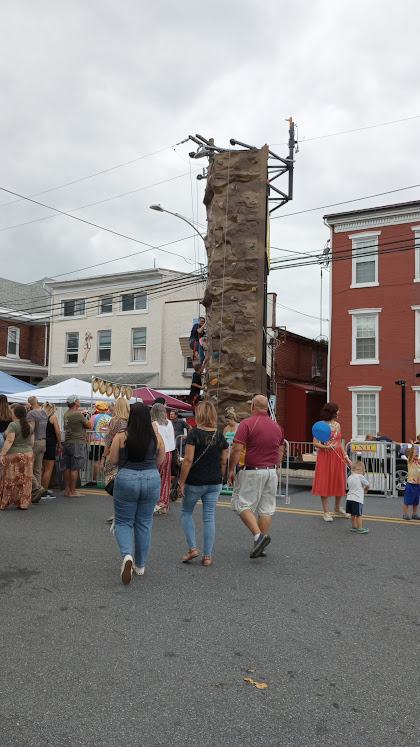
These festivals do not have to have a theme--where I grew up, it was just the TownName Street Fair--but a lot of them do. Food is the most common type of theme: you get Apple Festivals, Seafood Festivals, Tomato Festivals, Maple Syrup Festivals, all sorts. Something to do with local history and heritage is also common, like Old Time TownName Days. The amount of emphasis placed on the theme varies.

Since hamburgers are already a typical food to sell at festivals, they were very heavily represented at Hamburger Festival! The festival guide listed over forty different hamburger stands. I went around and took pictures of the menus for the ones that looked good, before deciding what to buy.

@griseldagimpel I think these two are probably the most innovative ones I saw!
There were some professional food trucks:

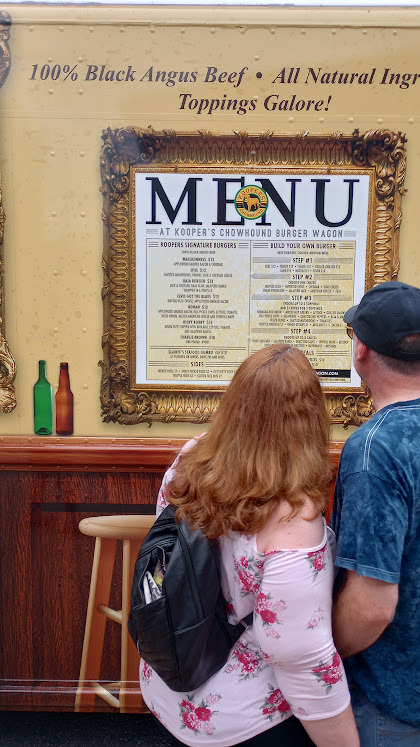
That second one had some interesting-looking options, too.

Here's another menu with some interesting options; this was one of a handful of stands offering a vegetarian burger option. (That Elvis one looks pretty innovative, too.)

There were a few stands offering the hamburger-with-a-crabcake-on-top, which sounded interesting, too.
Or if you just want a classic hamburger at a reasonable price, you could go with the stand run by the Boy Scouts:

Their burgers started at $5, and smelled pretty good!
Alcohol availability at town festivals varies regionally; in some parts of the US, it's considered inappropriate for alcohol (even beer) to be sold or consumed at events attended by families with children. Pennsylvania (where I live, and where Hamburg, PA is) used to be one of these, but our alcohol laws have been relaxing quite a bit over the last 10-15 years or so. As a result, Hamburger Festival does have beer and wine vendors.

However, they are limited to a fenced-off portion of the festival area, and if you buy a cup of beer you have to stay inside the fence to drink it. (Some of the vendors also offered discreetly-packaged bottles and cans to take home, but you are not allowed to open them on the premises.)

Of course, all of the food vendors are outside of the fence, so if you want to have a beer and a hamburger simultaneously, you have to buy the burger first, and take it into the Designated Beer Area.

This I did; I went with the Brie and Apricot Jam one, and a cranberry-ginger hard cider. (My other top choice for the burger was the Heavenly Hog one, with the apple slaw.) Both were excellent!
Band playing in the Beer Area:
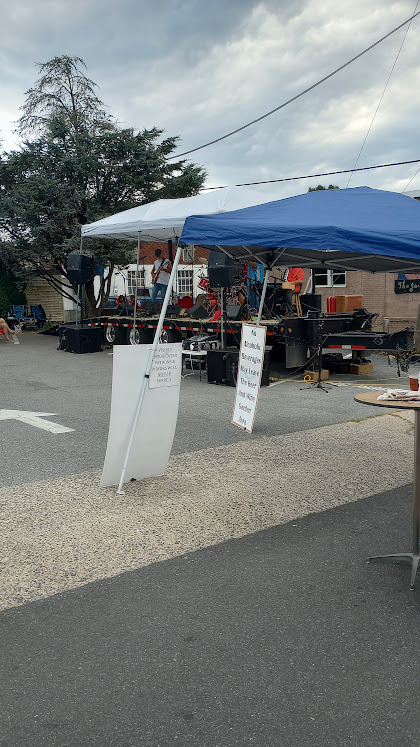
They also wisely placed the Great PortaPotty Cluster adjacent to the Beer Area:

Back outside of the Sin Zone, vendors include classic fair food:

And church bake sales:

Nonfood vendors include crafters/artisans, like this metalworker:
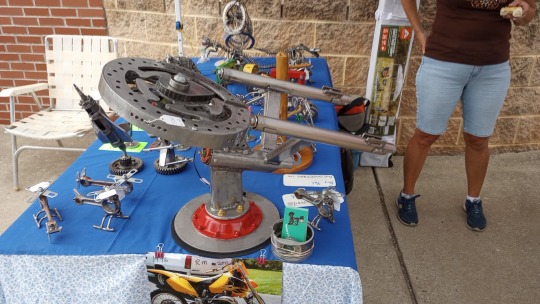
The Starship Enterprise was like $500, so I didn't buy it.
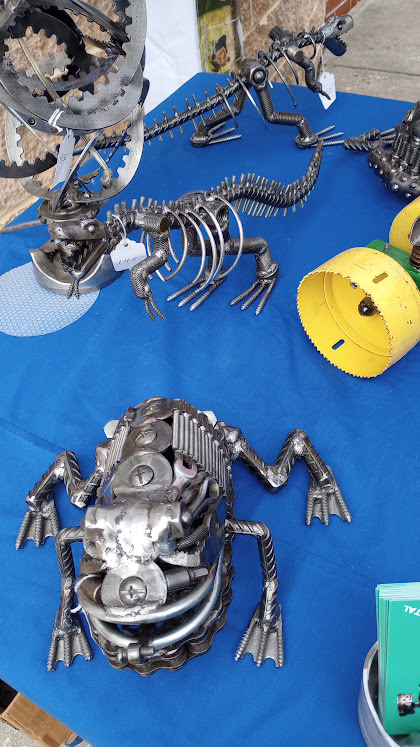
There are also crafters selling items with, uh, lower production values, and lower price points. There were a couple of booths selling 3-D printed fidget toys. I considered this polar bear, because it almost looks like Autism Creature:
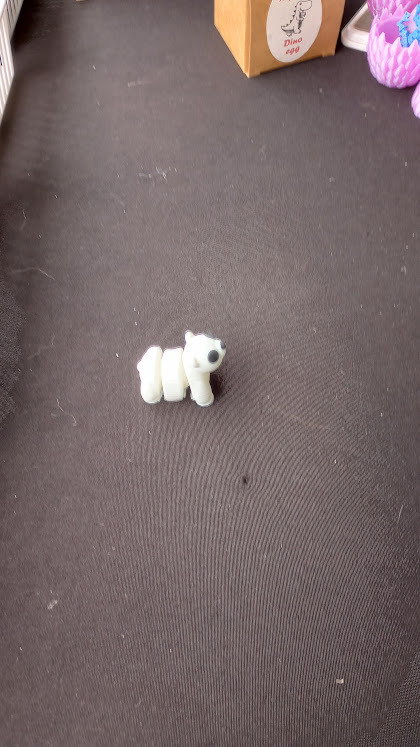
But in the end I went with something else, which I will share a little later.
They also this, a version of the betta-in-a-cup that won't make @kaxen mad:
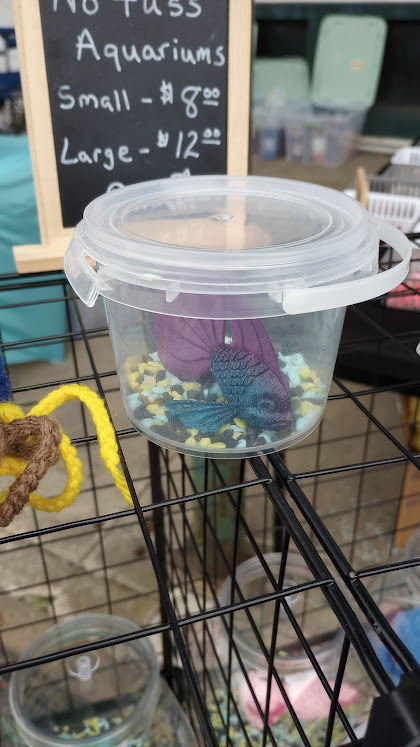
Pictured: The only kind of fish you should keep in such a tiny container!
Also represented were various kinds of MLM schlock:

Like this CutCo Knives stand; there was also a Pampered Chef one, several of the jewelry ones, and the one that does dip mixes and stuff; it isn't Taste of Home (that's a magazine), but it's something like that.

I did buy some seasoning mixes, but I got them from this decidedly more amateurish-looking (and cheaper) place, which also sold soap.
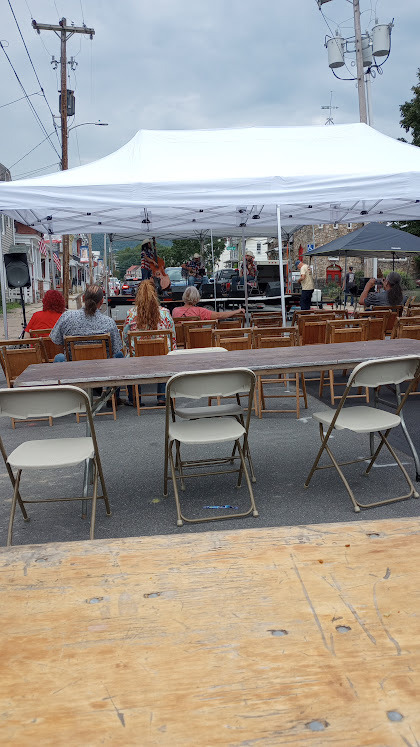
Another performance space; this one had a bluegrass trio that was actually pretty good.
Here a child had a stand selling 3D printed gizmos:
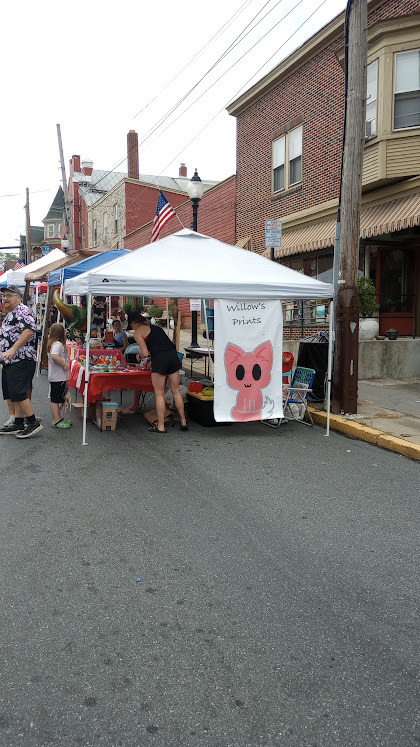
Where I obtained this treasure:
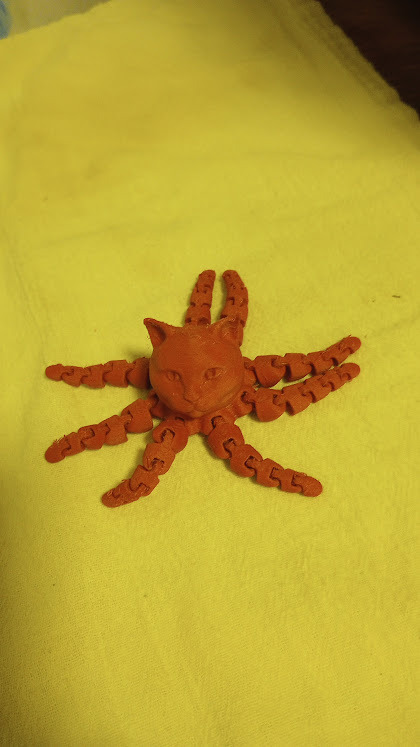
Her mother, it developed, had been highly skeptical that anyone would want to buy these, but I assured her that it was brilliant, and my favorite purchase of the day.
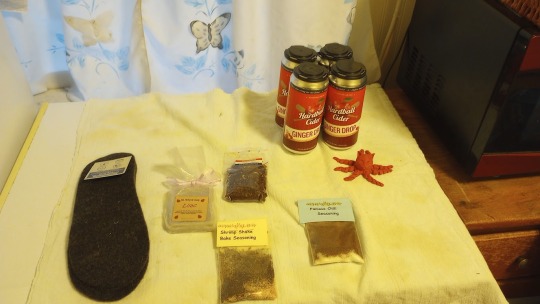
I also got take-home cider, the aforementioned spices and soap, some tea, and alpaca-fiber insoles. (My feet were sore, by that point.)
Another interesting thing, which I did not take any pictures of, is the evidence of widely-varying attitudes toward the festival, by the people who actually live on the streets where it takes place. The people behind the stand where I bought my brie-and-apricot burger had festooned their knee-high garden wall with wire and signs saying DO NOT SIT ON WALL, because, I guess, that harms them in some way, if someone does that. Other residents were having porch-parties to watch the festival, or were manning coolers of sodas and bottled water, usually for a dollar apiece (with this competition, most of the official vendors were also selling water and sodas for a dollar, but I bought from one of the porches anyway).
Anyway, to sum up, it was kind of neat; I don't necessarily have a burning desire to go again (although I would like to try that burger with the apple slaw), but I'd also be willing to go again. I spent way too much money on crap, but it's no fun going to something like that and not buying stuff.
34 notes
·
View notes
Note
How many different variations were there of the side sculptures on the replica proscenium? Because it's so intricate and detailed I can barely make out differences in pictures between different productions, but I know some have the statues 'draped', some seem to be double the size of others etc etc? (Some have wreaths , some have nothing but stil), thank you!
Well, good question. There are many variation of the same theme. Sometimes the differences are subtle, sometimes more noticeable.
Basically all versions, old and new, original and revamped, feature the upper side sculptures. The original combo was a winged woman behind a satyr, and one or two women wriggling away from the satyr at each side: One stretching in over the proscenium, the other either stretching out of the proscenium, or looking into the audience. They're standing on a lintel / architrave / horizontal decorativ frieze, just where the proscenium meets the auditorium.
Here's one from the original West End production c. 2014:

And here from the Hamburg revival in 2013:

Some of the upper side sculptures are sometimes cut. It can be due to weight, or them blocking the view of too many seats in the auditorium. That also goes for the lower side sculptures. Some prosceniums has featured none at all, others has featured smaller or bigger combos of them. The three most used ones are:
Full with drape underneath (left, Las Vegas, World Tour, US Tour etc), "regular" full (middle, West End, Broadway etc), half sculpture group focusing on the lower part (right, Japan, World Tour). The World Tour has also done the half-version with the drape under, which makes it look bigger. This is not depicted here.

And with this in mind... if ignoring the more subtle differences I'd say these are some main set-ups of the proscenium:
The main look has been like what was seen in West End and Broadway and many international productions to follow: The Golden Angel, lyres and garlands, plus sculpture groups at the upper corners and lower proscenium. Depicted under here is West End, Broadway and Basel.



A thing frequently seen in Japan is the same basic set-up, but lower and sometimes wider stage. Lower stage means fewer side sculptures. The upper side sculptures feature one less female figure, removing the one stretching into the auditorium. But more visible is the much smaller group underneath, in the lower side sculptures. They usually only do half the sculpture group. This is Tokyo 2005:

Then the World Tour in Guangzhou 2015. The set-up was very similar to that of Japan, with one less female sculpture at the upper sides, and with half a sculpture group in the lower half. But they did the drape construction under the sculptures, making them almost twice the size as what was seen in Tokyo.

And now for something completely different... The original Stockholm prododuction and later the Copenhagen production cut the side sculptures entirely due to the side-view seats. Instead this area featured a wreath. Note too the shorter distace between the Golden Angel and the side sculptures. This made for a beautiful, albeit top-heavy proscenium.
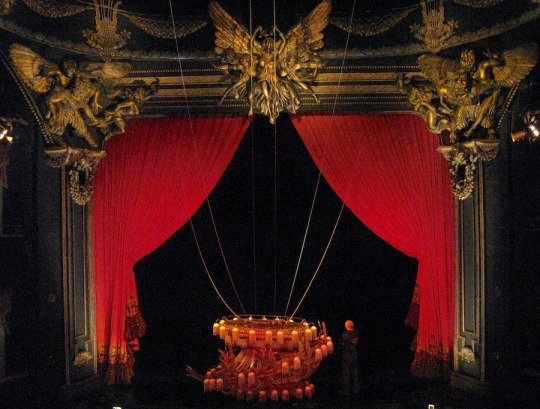
The Stockholm revival production was staged in a circular theatre, which meant there were not too many bearing constructions to attach the proscenium to, and the layout of the theatre meant a lot of seats would get the side-view blocked by eventual sculptures. So they kept the main proscenium, which was from the World Tour, but didn't do the lower side sculptures. Unlike the original Sctokholm production they didn't add an additional ornament either:
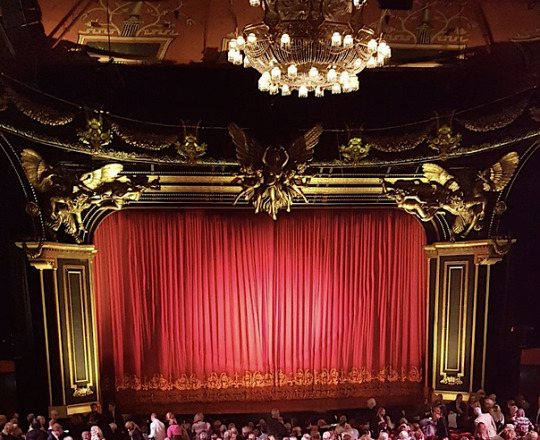
Then the rare case of the "double proscenium" in the original Viennese production. Due to the layout of the auditorium the top sculptures were placed in the outer area, while the lower side sculptures was moved in on stage.

Note that both the Stockholm/Copenhagen version, The Japanese version and the Viennese version was designed by Maria Bjørnson herself. It was her way of taking the original set-up and adapt it to the specific theatres. Ideally the proscenium should look like a part of the auditorium, blurring the lines between stage and audience, and for this elements has to be switched around. She was however very thorough with the placement of the Golden Angel and the surrouding garlands and lyres, making this a continuous curving line.
I think my all-time favourite of prosceniums matching the auditorium is the Paris set-up. It just... melts into the auditorium! They also did the whole shebang, all sculptures, all details. Aaaah!

My love for the World Tour is endless, but I really wish they would beef up that proscenium. The lack of the Golden Angel and the lack of the lower side sculptures makes it look a bit... boxy. A middle ornament of some sort and a wreath like Stockholm / Copenhagen would have softened the look considerably.

I could go on about the changes in the new prosceniums, the lack of side sculptures, lack of the Golden Angel, or the extended Las Vegas set, whatnot. But that's for another photoset. This one is rather a homage to the original design and various adaptions of it.
24 notes
·
View notes
Text
I wanted to try and translate some of the promotional images for the “Digital Circus x Tower Records Cafe” collab recently announced! Please check out the website proper for further information! ^^
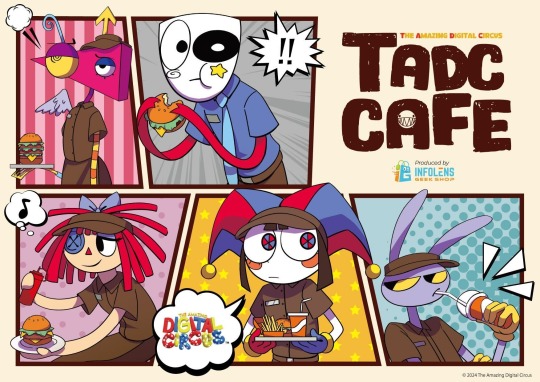

[Translated with Yandex]
"Collaboration Menu / Takeout Menu Order Benefits
Postcards: (First Term: 5 Species / Second Term: 5 Species)
Collaboration Menu - Takeout(?) Menu order 1 piece that random 1 piece [Illegible]
Early Period - (5 types in total)
[SAMPLE]
Later Stage - (5 types in total)
*The designs to be distributed in the first half and second half are different
*Designation of the design and of the exchange when the same design comes out can not be accepted
*There is a limited number. Please note that it will end as soon as it runs out”

[Translated with Yandex]
“FOOD
Hamburger of Pomni // Ragatha Omurice
* Figure in the image is not attached
SWEETS
Caine’s Cupcakes // Parfait of Zooble //
Jax Pancakes
* Figure in the image is not attached
DRINK
Gangle’s berry tea (hot) // Jax’ blueberry yogurt // Ragatha’s blue tea (hot) // Pomni & Kinger’s strawberry milk // Caine & Bubble’s Cranberry juice
TAKEOUT
Takeout bottle (popcorn)
* Figure in the image is not attached
2024 The Amazing Digital Circus”
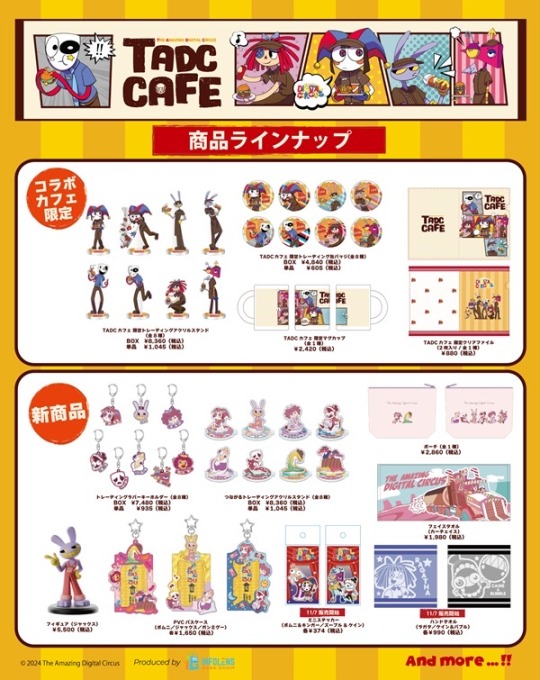
[Translated with Yandex]
“Production Lineup
Collaboration Cafe Limited Edition
TADC Cafe Limited Trading Acrylic Stand (All 8 Days)
TADC Cafe Limited Edition Badge (8 types in total)
TADC Cafe Limited Mug (All 1 Box)
TAD Cafe Limited Clear File (2 Pieces / All 1 Day)
New Products
[Illegible] Rubber Keychain (All 8 Days)
[Illegible] Acrylic Stands (8 types in total)
[Illegible]
Face Towel Car
Figure (Jax)
PVC [Illegible] Pomni/Jax/Gumigoo(?)
Mini stickers Pomni & Kinger // Caine & Zooble
Hand Towel Ragatha // Caine & Bubble
And More…!”
As you can tell it got really hard to translate some of this by the end, hopefully we get higher res versions of these photos! I’ll keep an eye out and if we do i’ll update this post with more accurate translations ^^
#the amazing digital circus#tadc#glitch productions#tower records cafe#japan exclusive#jp#english translation#news
13 notes
·
View notes
Note
yttd unpopular opinion: gashu is hot and deserves more simps(in response to the one post about yttd-related asks). also keiji shinogi chose the worst shade of yellow to dye his hair with. it legit looks like piss. also get some sleep mf. also i feel bad for hinako man, gurl's only value in her eyes was having information. she got like betrayed and stuff by the skinny green haired slut, its so unfair. also nankidai HOW DARE YOU NOT MAKE A RANMARU ROUTE ur telling me sara cant escape with this mop headed little sheep boi?!!?! tsk, sighs in major disappointment i expected more out of you nankidai. safalin is.. um. kind of an asshole?? kind of not?? mixed opinion here. in love w/ her design, though. also imo what she did to rio ranger(returning his emotions to him and turning him back to rio laizer) wasn't really cruel, i hope we get to see more of rio laizer in the last part of ch3. mai's arc is so amazing. big qmai shipper here. just yes. like im not too good at putting stuff into words but i love how she at first treats him the same way she'd treat her customers at the bakery- with a fake, bouncy, happy go lucky attitude, and it makes him uncomfortable, but when she starts acting like her real self he accepts her for who she is and prefers it to the mask she'd put on before. also bro forgave her for(literally) stabbing him in the back, that is so cute. its always 'the keiji simps' STFU WHERE MY KURUMADA SIMPS AT??? maple doesnt realize how LUCKY she was to get a face full of that guys tiddies. also in the emotion route when he asks reko to sing its just so frickin cute omg when everyones listening and glasses guy is like clapping and stuff :( reko x nao is so real, but honestly i dont ship naosara too much. like in the massacre ending i interpreted as like, platonic and stuff. i just think itd be sweet that way without making it romance. kanna is smarter than a lot of people give her credit for. she made the conscious decision to go alone with sou's lies in ch1 and she herself says its because she felt like sou had more useful info than kai, and one or the other had to go. i dont rmmber where she says so exactly?? but ill shoot my shot and assume its the emotion route. mishima is a madly underrated character. nao has a truly noble teacher. kai is canonically my wife. i have a lot of yttd related stuff dont mind me 😌🎀
ONE FOR EACH!!!!!!
one. as an official old mad lover i can confirm he's kinda hot. annoying? yes. hot? also yes.
two. YES BRO IT LOOKS LIKE SOMEONE PISSED ON HIM?!?!?! (me /hj)
three. i get this but as an original hinako fan i cannot stand her i dunno it's the attitude. she did NOT deserve to get kebabbed though.
four. hah. i HATE ranmaru so i can't relate. i giggled and CLAPPED when bro died. (he put me through hell in your turn to shine and also he killed my dude in the logic route </3)
five. I LOVE RIO RANGER // LAIZER SO MUCH I HOPE HE COMES BACK. and as for safalin me and my friend both agreed she's okay because she bends over in that chapter three
six. YESYEYSYEYSYEYS i love qmai (i don't SHIP-ship it but it's cute platonically and i love their relationship) and i love how they both had really good development towards each other and the others. UGH cubetaro hamburger makes me sick i adore him (my baseball husband </3)
seven. I AM HERE. I AM HERE. KURUMADA CAN GET IT ALL DAY ALL NIGHT. he makes me giggle i wanna take him out to lunch >_<
eight. i love naoreko!!! the scene in the alice route with nao painting mishima with reko AIRUHKETHJ. THEY HAVE SUCH A WHOLESOME RELATIIONSHIP UGHGHG. naosara makes me... eugh. since sara's seventeen and nao is implied to be in college so. uhghguhg i dunno. doesn't sit right with me?
nine. i've done the emotion route and. i don't remember this. hahahah. i love kai and hate sou so i'll just ignore it /silly. but. kanna IS a lot more important than sou (she has a higher survival rate than sou guys. it is more LOGICAL to choose her. but whatever.) i love kanna
ten. yYEYSYES?!?!?! I LOVE MISHIMA SO MUCH HE IS MY WIFE AND ALSO JUST SUCH A GOOD AND HONEST MAN?!??! the scenes with him and gin or kanna or nao made me wanna cry honestly. i hope we find out where his head went.
eleven. i think you mean. OUR wife!!!
UHG THANK YOU FOR THIS... FRIEND!!!!
#THANKS FOR THE ASK!!!#keiji shinogi#keiji yttd#gashu satou#hinako mishuku#hinako yttd#ranmaru kageyama#ranmaru yttd#tia safalin#yttd safalin#rio ranger#mai tsurugi#yttd mai#q taro burgerberg#naomichi kurumada#kurumada yttd#nao egokoro#nao yttd#reko yabusame#reko yttd#kanna kizuchi#sou hiyori yttd#kazuya mishima#mishima yttd#woah that's kinda a lot#rambles!#:3
10 notes
·
View notes
Text
In February 1994, in the grand ballroom of the town hall in Hamburg, Germany, the president of Estonia gave a remarkable speech. Standing before an audience in evening dress, Lennart Meri praised the values of the democratic world that Estonia then aspired to join. “The freedom of every individual, the freedom of the economy and trade, as well as the freedom of the mind, of culture and science, are inseparably interconnected,” he told the burghers of Hamburg. “They form the prerequisite of a viable democracy.” His country, having regained its independence from the Soviet Union three years earlier, believed in these values: “The Estonian people never abandoned their faith in this freedom during the decades of totalitarian oppression.”
But Meri had also come to deliver a warning: Freedom in Estonia, and in Europe, could soon be under threat. Russian President Boris Yeltsin and the circles around him were returning to the language of imperialism, speaking of Russia as primus inter pares—the first among equals—in the former Soviet empire. In 1994, Moscow was already seething with the language of resentment, aggression, and imperial nostalgia; the Russian state was developing an illiberal vision of the world, and even then was preparing to enforce it. Meri called on the democratic world to push back: The West should “make it emphatically clear to the Russian leadership that another imperialist expansion will not stand a chance.”
At that, the deputy mayor of St. Petersburg, Vladimir Putin, got up and walked out of the hall.
Meri’s fears were at that time shared in all of the formerly captive nations of Central and Eastern Europe, and they were strong enough to persuade governments in Estonia, Poland, and elsewhere to campaign for admission to NATO. They succeeded because nobody in Washington, London, or Berlin believed that the new members mattered. The Soviet Union was gone, the deputy mayor of St. Petersburg was not an important person, and Estonia would never need to be defended. That was why neither Bill Clinton nor George W. Bush made much attempt to arm or reinforce the new NATO members. Only in 2014 did the Obama administration finally place a small number of American troops in the region, largely in an effort to reassure allies after the first Russian invasion of Ukraine.
Nobody else anywhere in the Western world felt any threat at all. For 30 years, Western oil and gas companies piled into Russia, partnering with Russian oligarchs who had openly stolen the assets they controlled. Western financial institutions did lucrative business in Russia too, setting up systems to allow those same Russian kleptocrats to export their stolen money and keep it parked, anonymously, in Western property and banks. We convinced ourselves that there was no harm in enriching dictators and their cronies. Trade, we imagined, would transform our trading partners. Wealth would bring liberalism. Capitalism would bring democracy—and democracy would bring peace.
After all, it had happened before. Following the cataclysm of 1939–45, Europeans had indeed collectively abandoned wars of imperial, territorial conquest. They stopped dreaming of eliminating one another. Instead, the continent that had been the source of the two worst wars the world had ever known created the European Union, an organization designed to find negotiated solutions to conflicts and promote cooperation, commerce, and trade. Because of Europe’s metamorphosis—and especially because of the extraordinary transformation of Germany from a Nazi dictatorship into the engine of the continent’s integration and prosperity—Europeans and Americans alike believed that they had created a set of rules that would preserve peace not only on their own continents, but eventually in the whole world.
This liberal world order relied on the mantra of “Never again.” Never again would there be genocide. Never again would large nations erase smaller nations from the map. Never again would we be taken in by dictators who used the language of mass murder. At least in Europe, we would know how to react when we heard it.
But while we were happily living under the illusion that “Never again” meant something real, the leaders of Russia, owners of the world’s largest nuclear arsenal, were reconstructing an army and a propaganda machine designed to facilitate mass murder, as well as a mafia state controlled by a tiny number of men and bearing no resemblance to Western capitalism. For a long time—too long—the custodians of the liberal world order refused to understand these changes. They looked away when Russia “pacified” Chechnya by murdering tens of thousands of people. When Russia bombed schools and hospitals in Syria, Western leaders decided that that wasn’t their problem. When Russia invaded Ukraine the first time, they found reasons not to worry. Surely Putin would be satisfied by the annexation of Crimea. When Russia invaded Ukraine the second time, occupying part of the Donbas, they were sure he would be sensible enough to stop.
Even when the Russians, having grown rich on the kleptocracy we facilitated, bought Western politicians, funded far-right extremist movements, and ran disinformation campaigns during American and European democratic elections, the leaders of America and Europe still refused to take them seriously. It was just some posts on Facebook; so what? We didn’t believe that we were at war with Russia. We believed, instead, that we were safe and free, protected by treaties, by border guarantees, and by the norms and rules of the liberal world order.
With the third, more brutal invasion of Ukraine, the vacuity of those beliefs was revealed. The Russian president openly denied the existence of a legitimate Ukrainian state: “Russians and Ukrainians,” he said, “were one people—a single whole.” His army targeted civilians, hospitals, and schools. His policies aimed to create refugees so as to destabilize Western Europe. “Never again” was exposed as an empty slogan while a genocidal plan took shape in front of our eyes, right along the European Union’s eastern border. Other autocracies watched to see what we would do about it, for Russia is not the only nation in the world that covets its neighbors’ territory, that seeks to destroy entire populations, that has no qualms about the use of mass violence. North Korea can attack South Korea at any time, and has nuclear weapons that can hit Japan. China seeks to eliminate the Uyghurs as a distinct ethnic group, and has imperial designs on Taiwan.
We can’t turn the clock back to 1994, to see what would have happened had we heeded Lennart Meri’s warning. But we can face the future with honesty. We can name the challenges and prepare to meet them.
There is no natural liberal world order, and there are no rules without someone to enforce them. Unless democracies defend themselves together, the forces of autocracy will destroy them. I am using the word forces, in the plural, deliberately. Many American politicians would understandably prefer to focus on the long-term competition with China. But as long as Russia is ruled by Putin, then Russia is at war with us too. So are Belarus, North Korea, Venezuela, Iran, Nicaragua, Hungary, and potentially many others. We might not want to compete with them, or even care very much about them. But they care about us. They understand that the language of democracy, anti-corruption, and justice is dangerous to their form of autocratic power—and they know that that language originates in the democratic world, our world.
This fight is not theoretical. It requires armies, strategies, weapons, and long-term plans. It requires much closer allied cooperation, not only in Europe but in the Pacific, Africa, and Latin America. NATO can no longer operate as if it might someday be required to defend itself; it needs to start operating as it did during the Cold War, on the assumption that an invasion could happen at any time. Germany’s decision to raise defense spending by 100 billion euros is a good start; so is Denmark’s declaration that it too will boost defense spending. But deeper military and intelligence coordination might require new institutions—perhaps a voluntary European Legion, connected to the European Union, or a Baltic alliance that includes Sweden and Finland—and different thinking about where and how we invest in European and Pacific defense.
If we don’t have any means to deliver our messages to the autocratic world, then no one will hear them. Much as we assembled the Department of Homeland Security out of disparate agencies after 9/11, we now need to pull together the disparate parts of the U.S. government that think about communication, not to do propaganda but to reach more people around the world with better information and to stop autocracies from distorting that knowledge. Why haven’t we built a Russian-language television station to compete with Putin’s propaganda? Why can’t we produce more programming in Mandarin—or Uyghur? Our foreign-language broadcasters—Radio Free Europe/Radio Liberty, Radio Free Asia, Radio Martí in Cuba—need not only money for programming but a major investment in research. We know very little about Russian audiences—what they read, what they might be eager to learn.
Funding for education and culture needs rethinking too. Shouldn’t there be a Russian-language university, in Vilnius or Warsaw, to house all the intellectuals and thinkers who have just left Moscow? Don’t we need to spend more on education in Arabic, Hindi, Persian? So much of what passes for cultural diplomacy runs on autopilot. Programs should be recast for a different era, one in which, though the world is more knowable than ever before, dictatorships seek to hide that knowledge from their citizens.
Trading with autocrats promotes autocracy, not democracy. Congress has made some progress in recent months in the fight against global kleptocracy, and the Biden administration was right to put the fight against corruption at the heart of its political strategy. But we can go much further, because there is no reason for any company, property, or trust ever to be held anonymously. Every U.S. state, and every democratic country, should immediately make all ownership transparent. Tax havens should be illegal. The only people who need to keep their houses, businesses, and income secret are crooks and tax cheats.
We need a dramatic and profound shift in our energy consumption, and not only because of climate change. The billions of dollars we have sent to Russia, Iran, Venezuela, and Saudi Arabia have promoted some of the worst and most corrupt dictators in the world. The transition from oil and gas to other energy sources needs to happen with far greater speed and decisiveness. Every dollar spent on Russian oil helps fund the artillery that fires on Ukrainian civilians.
Take democracy seriously. Teach it, debate it, improve it, defend it. Maybe there is no natural liberal world order, but there are liberal societies, open and free countries that offer a better chance for people to live useful lives than closed dictatorships do. They are hardly perfect; our own has deep flaws, profound divisions, terrible historical scars. But that’s all the more reason to defend and protect them. Few of them have existed across human history; many have existed for a time and then failed. They can be destroyed from the outside, but from the inside, too, by divisions and demagogues.
Perhaps, in the aftermath of this crisis, we can learn something from the Ukrainians. For decades now, we’ve been fighting a culture war between liberal values on the one hand and muscular forms of patriotism on the other. The Ukrainians are showing us a way to have both. As soon as the attacks began, they overcame their many political divisions, which are no less bitter than ours, and they picked up weapons to fight for their sovereignty and their democracy. They demonstrated that it is possible to be a patriot and a believer in an open society, that a democracy can be stronger and fiercer than its opponents. Precisely because there is no liberal world order, no norms and no rules, we must fight ferociously for the values and the hopes of liberalism if we want our open societies to continue to exist.
23 notes
·
View notes
Text
Top Exhibition Stand Contractor Hamburg for Custom Trade Show Solutions
Looking for a reliable exhibition stand contractor Hamburg? At RADON SP. Z O.O., we specialize in creating custom trade show exhibits that stand out and attract visitors. With years of expertise, we deliver innovative, functional, and eye-catching booth designs tailored to your needs. From concept to construction, our team ensures a seamless and hassle-free experience. Whether you are participating in a local or international event in Hamburg, our high-quality stands enhance your brand visibility and engagement. Partner with us for professional stand designs that reflect your brand’s identity and leave a lasting impression.

#exhibition stand builder#exhibition booth construction in frankfurt#exhibitionstandbuilder#exhibition stand design company#exhibition stand design#radonspzoo#exhibition stand contractor hamburg#poland
0 notes
Text


Original MEDIEVAL SPAWN Action Figure and Comic REMASTERED ‘24
LAUNCHING AUG. 20th 7am PST/10am EST ON KICKSTARTER!
In 1992, the first SPAWN comic broke sales records, and by 1995, the launch of the initial Spawn action figure set new standards in the toy industry. Now, Todd McFarlane is partnering with Kickstarter to bring a remastered version of the iconic 1995 MEDIEVAL SPAWN action figure and comic. The 2024 Medieval Spawn figure will be the most detailed yet, available in three color variations: classic blue and red, bold black, and an all-gray artist's proof rendition. Backers can choose between autographed and non-autographed versions, with an autographed premium 3-pack also available. With the potential to unlock up to 14 FREE bonus accessories through TBA goals, this campaign promises excitement. With production of the figures already underway, we will begin shipping to many backers during the holiday season, with some backers receiving their figures before Christmas.

KEY FEATURES:
- The figure stands 7 inches tall with 32 points of articulation.
- Each figure includes a comic with original art on the cover by the award-winning Todd McFarlane.
- THREE Color Variations:
• Classic Blue and Red
• Black Variant
• All-Gray Artist's Proof
- Each color variation is available in autographed and non-autographed versions, with autographs done personally by Todd McFarlane on decorative nameplates.
- Magnetic accessories for easy customization:
• Standard Accessories: Long Sword, Round Shield, Classic Helmet, Right and Left Ornate Forearm Pads, Classic Chest Plate, and Skull Chain.
• Exclusive Accessories for Each Color Variant:
• Classic Blue Medieval Spawn: Valkyrie Helmet and Roman Helmet

• Black Medieval Spawn: Roman Helmet and Hamburger Head with Closed Mouth

• All-Gray Artist Proof Medieval Spawn: Valkyrie Helmet and Hamburger Head with Closed Mouth

- Each figure will be packaged in resealable blister packaging; faithfully recreating the 1995 design; packaged within a collector box with an added slipcover for protection.
- Figures will be shipped worldwide, with all backers responsible for their estimated shipping costs.
• Additional charges, such as regional taxes or customs fees, are NOT included and will vary based on your location.
Additionally, if the campaign reaches its TBA goals, backers can receive up to 14 FREE BONUS ACCESSORIES, providing even more options for customizations and display.



#image comics#spawn#medieval spawn#todd mcfarlane#toddmcfarlaneproductions#kickstarter#action figures#spawn universe
7 notes
·
View notes